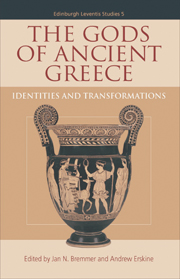Book contents
- Frontmatter
- Contents
- Preface
- List of Illustrations
- Notes on Contributors
- List of Abbreviations
- Introduction: The Greek Gods in the Twentieth Century
- 1 What is a Greek God?
- PART I SYSTEMATIC ASPECTS
- PART II INDIVIDUAL DIVINITIES AND HEROES
- PART III DIACHRONIC ASPECTS
- 14 Early Greek Theology: God as Nature and Natural Gods
- 15 Gods in Early Greek Historiography
- 16 Gods in Apulia
- 17 Lucian's Gods: Lucian's Understanding of the Divine
- 18 The Gods in the Greek Novel
- 19 Reading Pausanias: Cults of the Gods and Representation of the Divine
- 20 Kronos and the Titans as Powerful Ancestors: A Case Study of the Greek Gods in Later Magical Spells
- 21 Homo fictor deorum est: Envisioning the Divine in Late Antique Divinatory Spells
- 22 The Gods in Later Orphism
- 23 Christian Apologists and Greek Gods
- 24 The Materiality of God's Image: Olympian Zeus and Ancient Christology
- PART IV HISTORIOGRAPHY
- Epilogue
- Index
18 - The Gods in the Greek Novel
from PART III - DIACHRONIC ASPECTS
Published online by Cambridge University Press: 05 August 2013
- Frontmatter
- Contents
- Preface
- List of Illustrations
- Notes on Contributors
- List of Abbreviations
- Introduction: The Greek Gods in the Twentieth Century
- 1 What is a Greek God?
- PART I SYSTEMATIC ASPECTS
- PART II INDIVIDUAL DIVINITIES AND HEROES
- PART III DIACHRONIC ASPECTS
- 14 Early Greek Theology: God as Nature and Natural Gods
- 15 Gods in Early Greek Historiography
- 16 Gods in Apulia
- 17 Lucian's Gods: Lucian's Understanding of the Divine
- 18 The Gods in the Greek Novel
- 19 Reading Pausanias: Cults of the Gods and Representation of the Divine
- 20 Kronos and the Titans as Powerful Ancestors: A Case Study of the Greek Gods in Later Magical Spells
- 21 Homo fictor deorum est: Envisioning the Divine in Late Antique Divinatory Spells
- 22 The Gods in Later Orphism
- 23 Christian Apologists and Greek Gods
- 24 The Materiality of God's Image: Olympian Zeus and Ancient Christology
- PART IV HISTORIOGRAPHY
- Epilogue
- Index
Summary
How important are gods to the Greek novel? And how much do the novels encourage the view that the gods are active in human affairs? In this chapter I consider the frequency with which named, and also unspecified, gods are mentioned and how essential they are to the action of the novel. I shall conclude that in many cases it is not enough simply to view them in terms of literary convention and that literary convention itself depends on some acceptance within the world of the novel of beliefs that would be held in the real world.
The range of narrative literature considered by specialists in the ancient novel has increased and diversified over the last twenty or so years. The more diverse the novel, the less that can be said in general about any single issue, ‘gods in the novel’ included. For this chapter, however, I revert to the so- called ‘ideal novel’, by which I mean the novels of Chariton, Xenophon, Achilles Tatius, Longus and Heliodorus. These form an unusually close-knit group of apparently very similar plots and often comparable tastes. It is unfashionable but not wholly irresponsible to speak of them as a genre. At the same time, they do themselves vary in character, and perhaps the divine is one area where they differ significantly. These are all imperial texts: the earliest, Chariton, must be mid to late first century AD, and the latest, Heliodorus, could be anywhere between the 220s and the 350s.
- Type
- Chapter
- Information
- The Gods of Ancient GreeceIdentities and Transformations, pp. 362 - 374Publisher: Edinburgh University PressPrint publication year: 2010



